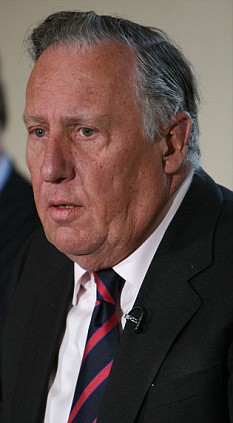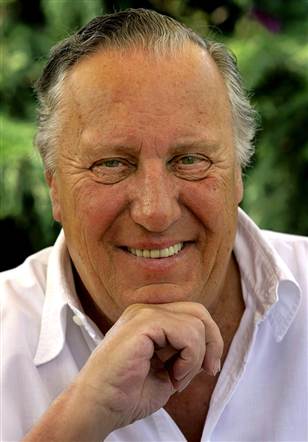<Back to Index>
- Physiologist Charles Robert Richet, 1850
- Writer Frederick Forsyth, 1938
- King of Bavaria Ludwig I, 1786
PAGE SPONSOR



Frederick Forsyth, CBE (born 25 August 1938) is an English author and occasional political commentator. He is best known for thrillers such as The Day of the Jackal, The Odessa File, The Fourth Protocol, The Dogs of War, The Devil's Alternative, The Fist of God, Icon, The Veteran, Avenger, The Afghan and The Cobra.
The son of a furrier, Forsyth was born in Ashford, Kent. He was educated at Tonbridge School and later attended the University of Granada in Spain. He became one of the youngest pilots in the Royal Air Force at the age of 19, where he served on National Service from 1956 to 1958. Becoming a journalist, he joined Reuters in 1961 and later the BBC in 1965, where he served as an assistant diplomatic correspondent. From July to September 1967, he served as a correspondent covering the Nigerian Civil War between the region of Biafra and Nigeria. He left the BBC in 1968 after controversy arose over his alleged bias towards the Biafran cause and accusations that he falsified segments of his reports. Returning to Biafra as a freelance reporter, Forsyth wrote his first book, The Biafra Story in 1969.
Forsyth decided to write a novel using similar research techniques to those used in journalism. His first full length novel, The Day of the Jackal, was published in 1971 and became an international bestseller and gained its author the Edgar Allan Poe Award for Best Novel. In this book, the Organisation Armée Secrète (a real - life terrorist group) hires an assassin to kill then - French President Charles de Gaulle. It was made into a film of the same name.
In Forsyth's second full length novel, The Odessa File (1972), a reporter attempts to track down a certain ex - Nazi SS officer in modern Germany. The reporter discovers him via the diary of a Jewish Holocaust survivor who committed suicide earlier, but he is being shielded by an organization that protects ex - Nazis, called ODESSA. This book was later made into a movie with the same name, starring Jon Voight, but there were substantial alterations.
In The Dogs of War (1974) a British mining executive hires a group of mercenaries to overthrow the government of an African country so that he can install a puppet regime that will allow him cheap access to a colossal platinum - ore reserve. This book was also adapted to film, in 1981, starring Christopher Walken and Tom Berenger.
The Shepherd was an illustrated novella published in 1975. It tells of a nightmare journey by an RAF pilot while flying home for Christmas in the late 1950s. His attempts to find a rational explanation for his eventual rescue prove as troublesome as his experience.
Following this came The Devil's Alternative in 1979, which was set in 1982. In this book, the Soviet Union faces a disastrous grain harvest. The USA is ready to help for some political and military concessions. A Politburo faction fight ensues. War is proposed as solution. Ukrainian freedom fighters complicate the situation later. In the end, a Swedish oil tanker built in Japan, a Russian airliner hijacked to West Berlin and various governments find themselves involved.
In 1982, No Comebacks, a collection of ten short stories, was published. Some of these stories had been written earlier. Many were set in the Republic of Ireland where Forsyth was living at the time. One of them, "There Are No Snakes In Ireland", won him a second Edgar Allan Poe Award, this time for best short story.
The Fourth Protocol was published in 1984 and involves renegade elements within the Soviet Union attempting to plant a nuclear bomb near an American airbase in the UK, intending to influence the upcoming British elections and lead to the election of an anti - NATO, anti - American, anti - nuclear, pro-soviet Labour government. The Fourth Protocol was later filmed, starring Pierce Brosnan and Michael Caine, in 1987. Almost all of the political content was removed from the film.
Forsyth's tenth book came in 1989 with The Negotiator, in which the American President's son is kidnapped and one man's job is to negotiate his release.
Two years later, in 1991, The Deceiver was published. It includes four separate short stories reviewing the career of British secret agent Sam McCready. At the start of the novel, the Permanent Under - Secretary of State (PUSS) of the Foreign and Commonwealth Office requires the Chief of the SIS to push Sam into early retirement. The four stories are presented to a grievance committee in an attempt to allow Sam to stay on active duty with the SIS.
In 1994, Forsyth published The Fist of God, a novel which concerns the first Gulf War. Next, in 1996, he published Icon, about the rise of fascists to power in post - Soviet Russia.
In 1999, Forsyth published The Phantom of Manhattan, a sequel to The Phantom of the Opera. It was intended as a departure from his usual genre; Forsyth's explanation was that "I had done mercenaries, assassins, Nazis, murderers, terrorists, special forces soldiers, fighter pilots, you name it, and I got to think, could I actually write about the human heart?" However, it did not achieve the same success as his other novels, and he subsequently returned to modern day thrillers.
In 2001, The Veteran, another collection of short stories, was published, followed by Avenger, published in September 2003, about a Canadian billionaire who hires a Vietnam veteran to bring his grandson's killer to the US. Avenger was released as a film starring Sam Elliot and Timothy Hutton.
The Afghan, published in August 2006, is an indirect sequel to The Fist of God. Set in the very near future, the threat of a catastrophic assault on the West, discovered on a senior al-Qaeda member's computer, compels the leaders of the U.S. and the UK to attempt a desperate gambit — to substitute a seasoned British operative, retired Col. Mike Martin (of The Fist of God), for an Afghan Taliban commander being held prisoner at Guantánamo Bay.
The Cobra, published in 2010, features some of the characters previously featured in Avenger, and has as its subject an attempt to destroy the world trade in cocaine. Forsyth
eschews psychological complexity in favour of meticulous plotting,
based on detailed factual research. His books are full of information
about the technical details of such subjects as money laundering, gun
running and identity theft. His novels read like investigative
journalism in fictional guise. His moral vision is a harsh one: the
world is made up of predators and prey, and only the strong survive. Forsyth's
novels typically show the ways in which spies, gangsters, assassins,
mercenaries, diplomats, business leaders and politicians go about their
business behind - the - scenes; the sort of things that the average reader
would not suspect while reading a simple headline. The Jackal does not
just go out and shoot at Charles de Gaulle: he does meticulous research
on the man at the library of the British Museum;
obtains papers for his false identities; travels around Paris to find a
good location for a sniper's nest; and buys and tests his weapons. Also
a subtle twist at the end of the novel can reveal that a lot more was
going on than the reader initially suspected: Cat Shannon, the central
figure of The Dogs of War, turns out to have had his own agenda all the time; Adam Munro of The Devil's Alternative finds out that he was not a player but a pawn to people in high places; in The Odessa File, the reporter's true motivation is revealed at the end, and a number of events in Icon turn out to have been committed by people other than those who the reader had been led to suppose. In Avenger, one of the events that allows the Avenger to escape is unexplained until the last few paragraphs. Forsyth's novels also feature famous personalities and political leaders as characters — The Day of the Jackal features the French president Charles de Gaulle and his interior minister, Roger Frey, who heads the government search for the assassin — the opening chapter is based on an actual attempt by the OAS to kill de Gaulle. The Odessa File features the real life Nazi murderer Eduard Roschmann and the Nazi hunter Simon Wiesenthal. The Fourth Protocol and Icon involve several chapters indirectly featuring former British prime minister Margaret Thatcher and former US president George H. W. Bush.
Although unnamed or of fictional identity, the leader of the Soviet
Union is portrayed as the lead antagonist in several novels. Other real
life characters are thinly disguised. For example, real life suspected
Russian arms dealer Victor Bout is portrayed as "Vladimir Bout" in Avenger. Forsyth is a Eurosceptic Conservative. He is Patron of Better Off Out, an organisation calling for Britain's withdrawal from the European Union. In 2003, he was awarded the One of Us Award from the Conservative Way Forward group for his services to the Conservative movement in Britain. He is also a patron of the Young Britons' Foundation. In 2005, he came out in opposition to Kenneth Clarke's candidacy for the leadership of the Conservative Party,
calling Clarke's record in government "unrivalled; a record of failure
which at every level has never been matched". Instead, he endorsed and
donated money to David Davis's campaign. He is a strong supporter of the British monarchy. In his book Icon, he recommended a constitutional monarchy as a solution to Russia's political problems following the collapse of the Soviet Union. He
is an occasional radio broadcaster on political issues, and has also
written for newspapers throughout his career, including a weekly page in
the Daily Express. In 2003, he criticised "gay - bashers in the churches" in The Guardian newspaper. He has narrated several documentaries, including Jesus Christ Airlines, Soldiers, a history of men in battle and I Have Never Forgotten You: The Life & Legacy of Simon Wiesenthal. In August 2006, Forsyth appeared on the ITV gameshow Who Wants To Be A Millionaire? to raise funds for charity. On 8 February 2007, Forsyth appeared on BBC's political panel show Question Time. On it, he expressed scepticism on the subject of anthropogenic climate change. On 26 March 2008, he also appeared on BBC's The One Show. On 17 June 2008, Forsyth was interviewed on BBC Radio 5 LiveMidday News in relation to the restoration of the Military Covenant. During the interview he referred to Gordon Brown as a numpty. In October 2010, Forsyth was shortlisted for the award of Bigot of the Year in the 2010 Stonewall Awards.

